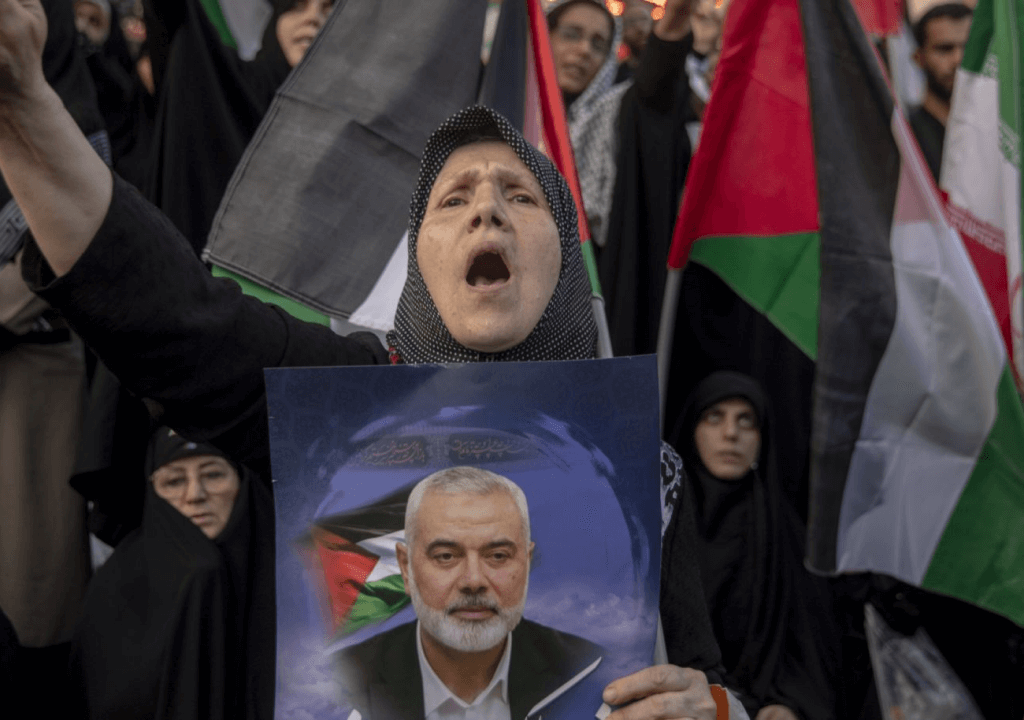It was a significant week for Israel; they humiliated Hamas, Hezbollah, and the Islamic Republic all in the same week. They killed Hamas’s political chief, Ismail Haniyeh, at a safe house during his visit to the Iranian capital, Tehran, just hours after killing Hamas’s military commander, Mohammed Deif, at a safe house in the Lebanese capital, Beirut. The Qatar-based official’s death is likely to affect progress in talks for a ceasefire and hostage release deal, which were already faltering. It appears that Israel is gaining the upper hand, with Arab countries uninterested in regional escalation, and the UN is a big humor.
Hamas, which began the conflict with a brutal attack on October 7th by crossing into Israeli territory, is now facing severe repercussions. Their leaders are being consistently assassinated, even as they flee to Syria, Iran, or Qatar. Hamas’s plan to negotiate using hostages has already failed, and the people of Gaza, who initially celebrated the attack, are now suffering the most. According to Hamas authorities, the death toll in Gaza has approached 40,000 and the situation seems far from being resolved, as indicated by Netanyahu’s address to the U.S. Congress.
Ismail Haniyeh, who lost all his family members in Israel’s retaliatory actions, was an important figure in the Hamas movement. While Hamas will likely regroup and survive, this war has left them with a leadership vacuum. Salah al-Arouri, considered one of Haniyeh’s deputies, was killed in a strike in Lebanon in January, and Marwan Issa, Hamas’s deputy military chief, was reportedly killed in Nuseirat in March. On Thursday, the Israel Defense Forces (IDF) confirmed that an airstrike in Khan Younis last month successfully targeted Hamas’s military chief, Mohammed Deif.
In the past, Hamas used a secret ballot in Gaza, the West Bank, Israeli prisons, and abroad to choose their political chief, but that is currently impossible. Instead, Khaled Meshaal, who is currently the head of the Hamas office in the Palestinian diaspora and was Haniyeh’s predecessor, is likely to step back into the role, at least as the acting politburo leader. Khalil al-Hayya, a Qatar-based deputy who has led Hamas’s ceasefire negotiation team, is from Gaza and is reportedly well-regarded by officials in Tehran, which positions him well to succeed Haniyeh.
Even if a peace-seeking leader were to emerge within Hamas, peace in Gaza remains elusive. Prime Minister Netanyahu has consistently affirmed that the military operation will continue until all Hamas militants are eliminated. Israel claims to have eliminated half of the leadership of Hamas’s military wing, including six senior brigade commanders and more than 20 battalion commanders, and to have killed or wounded 14,000 militants. With the collapse of the hostage deals Hamas was relying on, it is becoming evident that this is the endgame for Hamas.
Hezbollah, engaged in conflict with Israel alongside Hamas, is facing significant setbacks despite their control over certain territories. They have suffered major losses from Israel’s targeted strikes, with the most recent incident involving the death of a key militant leader who was believed to be secure in a residential area of Beirut. This event is a humiliation not only for Hezbollah but also for Lebanon. Last week, Hezbollah reportedly sent a warning through U.S. mediators that any strikes on Beirut would cross a red line and lead to retaliation against Tel Aviv. Despite this warning, Israel seems to have disregarded it and continues its hunt of Hezbollah leaders, exacerbating the group’s troubles.
The Guardian of Hamas and Hezbollah, Iran’s Supreme Leader Khamenei, led the prayers over the coffins of Haniyeh and his bodyguard, who were draped in traditional black and white Palestinian scarves. Iran is also facing turmoil due to escalating tensions with Israel. Many believe that the death of former Islamic Republic President Ebrahim Raisi was planned and executed by Israel, along with other reported deaths from targeted killings. Despite attempts at retaliation, Iran has been unable to take effective action against Israel. However, Iran appears to be increasingly enraged. Speakers at Haniyeh’s funeral, which was attended by Khamenei, Iran’s new president Masoud Pezeshkian, Revolutionary Guards chief Gen. Hossein Salami, and senior members of Hamas and Palestinian Islamic Jihad, vowed to avenge his death. While Israel has already launched a new wave of attacks in Lebanon, Iran’s response is of significant interest. It remains to be seen whether Iran will continue its proxy warfare using militants in Syria, Lebanon, and Yemen, or if it will escalate to a direct conflict with Israel or engage in combined warfare similar to the 1960s.
Israeli Prime Minister Benjamin Netanyahu doesn’t have any worries on escalating situations and they announced on Thursday that his country is fully prepared to respond to any aggression from any party. Although international officials have limited influence over Israel and Iran, they are working to de-escalate the cycle of retaliation and prevent a broader conflict.








